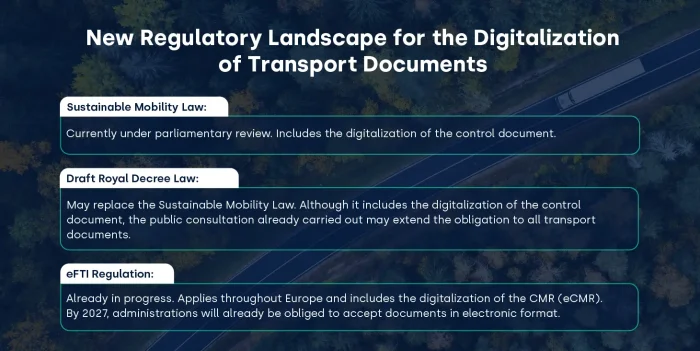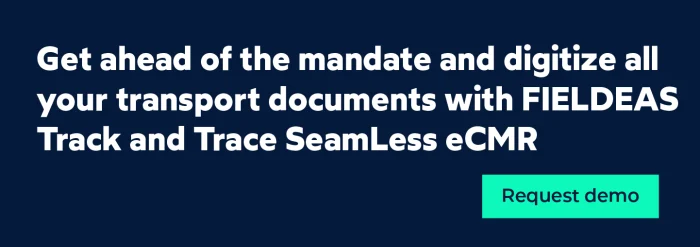New boost to the digitalization of freight transport: MTMS launches a Royal Decree


The digitization of road freight transport is picking up speed. The Ministry of Transport and Sustainable Mobility (MTMS) has launched for public consultation a draft Royal Decree that seeks to modernize the current regulations, and among its objectives is to impose the digitization of the administrative control document.
A measure that undoubtedly marks a step forward. However, the sector has taken advantage of the public consultation to call for a real, effective and intelligent digitalization.
Thus, companies and associations claim that it is not enough to digitize the control document, but that it is necessary to go a step further and extend the obligation to the national consignment note and the CMR.
On June 23, the Ministry opened the prior public consultation for a Royal Decree that would modify three key texts:
This last point is the one of interest regarding the digitalization of road freight transport. Specifically, the proposal includes the obligation to use the control document in digital format in road transport.
To fully understand what the control document is and how it differs from other documents, you can read this complete guide on the different transport documents.
The control document is a document that accompanies each shipment and serves for administrative and inspection purposes. It has no legal value as a contract and does not certify delivery or the exact contents of the shipment. It does not require an advanced electronic signature.
In other words, it is used for control purposes, but it is not the legal basis for transportation.
The documents that do have legal validity are:
Both documents do legally bind the parties and allow for legal action in case of conflict.
In this post we explain in detail why it is essential to boost the use of electronic CMR in Spain as part of the digital transformation of the sector.
The industry asserts that it is essential to take advantage of this regulatory moment to digitize all transport documents.
The explanation focuses on the fact that digitizing only the control document is inefficient, since it provides agility in inspection, but does not structurally transform transport management.
If you are wondering whether eCMR will be mandatory, here we take an in-depth look at the time horizons for key regulations (Sustainable Mobility Act and eFTI Regulation: Is eCMR mandatory?
With the draft Royal Decree, the timetable for the entry into force of the mandatory digitization of transport documents varies slightly:

In view of the above, waiting for a regulation to force action is a bad strategy. Companies that get ahead of the curve not only comply sooner, but also gain efficiency, reduce costs and position themselves better in the eyes of customers and partners.
Digitizing the control document may be the first step, but it is not the only one, nor the most transformative. The real leap is to digitize also the national consignment note and the CMR, incorporating advanced electronic signature and eliminating paper from daily operations.
In addition, the digitization of transport documents already has full legal and regulatory guarantees, as we explained in the post eCMR in Spain: complete guide on the digital consignment note, regulation and time horizons.
It’s not just about compliance. It’s about being more competitive, more agile and prepared for a digital, connected and demanding environment.
The digitalization of transport is advancing and the new Royal Decree represents an unprecedented opportunity. However, if progress is limited to the control document, we will be losing effectiveness, efficiency and legal certainty.
The industry is calling for global, legally binding and operationally efficient digitization. Digitizing just to comply is not transforming. Transforming is eliminating paper, eliminating friction and generating reliable data in real time.
It is time to push for the digitization of all road transport documents. Only then will we move towards a truly connected, sustainable and competitive supply chain.
The digitization of road freight transport can now be carried out in a comprehensive way thanks to the SeamLess eCMR solution from FIELDEAS Track and Trace.
This transport document digitization module already allows you to digitize all documents, whether mandatory or not, in a secure and efficient way.
The SeamLess eCMR of FIELDEAS Track and Trace is one of the few solutions in the market that offers complete legal and regulatory guarantee by having the capacity to include all the required information depending on the type of transport and including the advanced digital signature in the processing of the documentation, as well as guaranteeing the integrity of the information in the custody of the document.


12 Jun 2024
eCMR and data protection: everything you need to know

24 Nov 2025
eCMR in Spain: complete guide to the digital consignment note, regulation and time horizons

11 Apr 2024
eCMR or electronic consignment note, why implement it?

21 May 2024
eCMR, consignment note, control document, delivery note, are they the same?